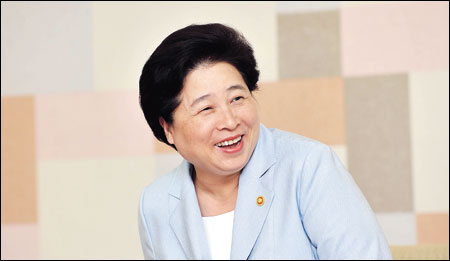
As Korea is becoming more multicultural and multiracial, the government is seeking to introduce an anti-discrimination law, arguing that racism should not be tolerated.
Minister of Gender Equality and Family Kim Kum-lae pointed out that the country doesn’t have a law banning racial discrimination although it is seeing a growing number of people from different ethnic backgrounds.
“For human rights infringement and other types of discrimination, victims can file a complaint with the National Human Rights Commission. But we need a law to more effectively help those being racially discriminated against,” she said in an interview on the occasion of The Korea Times’ Multicultural Korea Youth Awards to be presented on Dec. 13.
“We will seek the legislation of a law banning discrimination in a second five-year master plan for a multiracial family policy that will be made soon and implemented between 2013 and 2018,” Kim said.
Kim said her ministry is looking into more systematic ways to form a multicultural society without prejudice and discrimination. “We believe such a law and other measures will help develop positive recognition about multiracial families and help them have a more stable life here.”
Problems facing interracial children
According to a statistics released in January, 62.1 percent of some 168,500 children from multiracial families are preschoolers aged six or under. Thus, the ministry’s policy for them has been focused on childcare.
But they grow up, and the nation also sees a growing number of children who were born overseas and came to Korea after; so the nation needs stronger support for adolescents with such family backgrounds, Kim said.
“Those who were born in Korea to foreign mothers and those who came to Korea later after a parent’s remarriage may face different difficulties, so different solutions are needed.”
She said that for the former group, the ministry will have more programs that can prevent discrimination against them in education and living, while for the latter group who are generally older, it will come up with more support for vocational education.
The minister said it is important to have these children and adolescents get a proper education. According to the ministry’s report in February last year, 1.58 percent of middle school students and 1.92 percent of high school students of interracial families quit schools, while the ratios for children from non-multicultural families were 0.8 percent and 1.7 percent, respectively.
A separate report released in October by Rep. In Jae-keun of the Democratic United Party showed that 66.8 percent of children from multiracial families were attending elementary, middle or high schools this year.
The figure was about two thirds of the country’s total percentage of school attendance estimated at 96.1 percent. The report said only 56 percent of those of middle school age and 35 percent of those of high school age were attending.
“Multiracial children are society’s valuable human resources. Their potential and experience in diverse cultures will be the basis of Korea’s dynamic development,” Kim said.
The ministry operates programs to help them learn Korean and catch up with the school curriculum, as well as offer various activities where multiracial and non-multiracial children learn how to understand and respect each other.
“Besides policies preventing them from quitting school and helping them adapt to school life, we’ll promote policies giving them various education on careers and helping them get jobs, so that they can become true members of society,” she said.
Boosting understanding
Multiracial children often have low self-esteem due to social prejudice against their families or bullying at school. To solve the problems, the minister said the nation needs to boost people’s understanding about multiculturalism.
“To prepare for a more mature multicultural society, we need to set an integration policy through national consensus,” she said.
Kim highly evaluated The Korea Time’s multicultural awards for talented youth from multi-ethnic families.
“Through the awards, I hope children from interracial families can develop more self-confidence and society will become mature enough to respect diversity,” she said. <The Korea Times/Kim Rahn>



